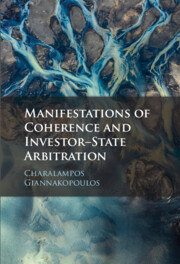Book contents
- Manifestations of Coherence and Investor–State Arbitration
- Manifestations of Coherence and Investor–State Arbitration
- Copyright page
- Contents
- Preface and Acknowledgements
- Table of Cases
- Table of International Conventions
- Table of International Investment Agreements
- Table of Procedural Rules
- Abbreviations
- Introduction
- 1 The Content of Coherence
- 2 Coherence and Legal Reasoning
- 3 Two Models for Coherence
- 4 Coherence and the Interpretation of Treaties
- 5 Coherence and Analogical Reasoning
- 6 Coherence as Reflexivity
- 7 Coherence as Moral Responsibility
- Coda
- Epilogue
- Bibliography
- Index
7 - Coherence as Moral Responsibility
Published online by Cambridge University Press: 13 December 2022
- Manifestations of Coherence and Investor–State Arbitration
- Manifestations of Coherence and Investor–State Arbitration
- Copyright page
- Contents
- Preface and Acknowledgements
- Table of Cases
- Table of International Conventions
- Table of International Investment Agreements
- Table of Procedural Rules
- Abbreviations
- Introduction
- 1 The Content of Coherence
- 2 Coherence and Legal Reasoning
- 3 Two Models for Coherence
- 4 Coherence and the Interpretation of Treaties
- 5 Coherence and Analogical Reasoning
- 6 Coherence as Reflexivity
- 7 Coherence as Moral Responsibility
- Coda
- Epilogue
- Bibliography
- Index
Summary
Chapter 7 addresses the following question: How can reflexivity be promoted in the collective context of investor-state dispute settlement, so as to help bridge individually held views by arbitrators that often come into competition or conflict with one another? The response that this chapter offers is that collective reflexivity can be promoted by acknowledging the presence of moral responsibility in arbitrators and by arbitrators committing to five distinct judicial virtues, namely: faith, humility, acquiescence, integrity, and candour. Judicial virtues are habits and mental dispositions, not an equation for the courtroom. They are thus meant as a framework offering guidelines and a roadmap to develop better deliberative practices. The chapter analyses the content of each virtue and assesses observable behaviour in investor-state dispute settlement under each of them.
- Type
- Chapter
- Information
- Manifestations of Coherence and Investor-State Arbitration , pp. 252 - 295Publisher: Cambridge University PressPrint publication year: 2023

